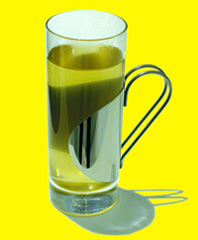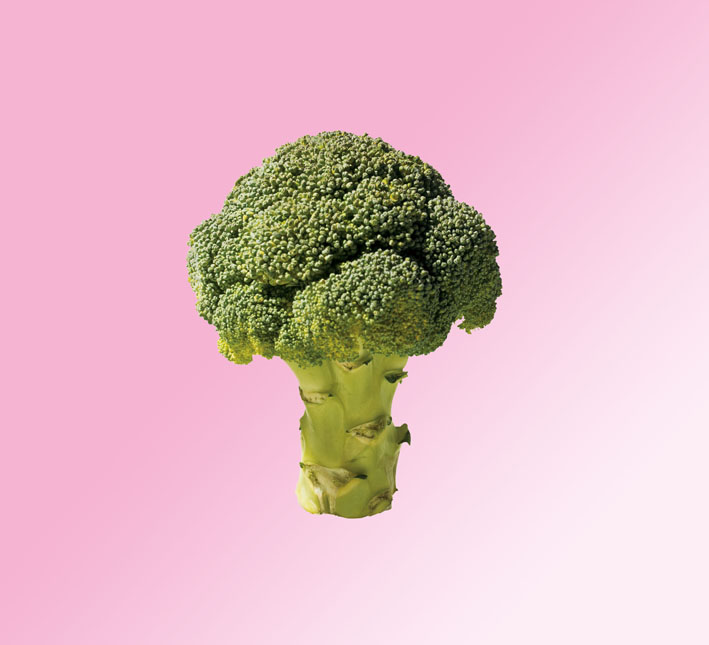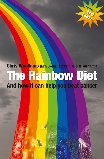Professor Robert Thomas and his research team have completed a randomised double blind, placebo controlled trial of an polyphenol-rich dietary food supplement, called Pomi-T, in men with prostate cancer; reducing PSA levels after 6 months by 63%, it contains broccoli, turmeric, pomegranate and EGCG (green tea).
Polyphenol-rich Pomi-T ‘highly effective' at reducing PSA in clinical trial
Professor Robert Thomas and his research team have completed a randomised double blind, placebo controlled trial of an antioxidant-rich dietary food supplement in men with prostate cancer. Professor Thomas is the Consultant Oncologist at Cranfield University and Bedford & Addenbrooke’s, NHS Hospital Trusts.
Thomas reports in the Study Introduction
‘This scientifically robust study aims to establish whether boosting the diet with a food supplement rich in plant chemicals (polyphenols),which have antioxidant and other potential anti-cancer properties, has an influence on PSA progression compared to placebo.
Epidemiological and large cohort studies support the paradigm that antioxidant-rich diets reduce the risk of prostate cancer (Giovannucci et al 2002). More recently prospective studies show that diet and lifestyle may also benefit men with established disease by slowing or halting PSA progression (Ornish 2005, Thomas 2008).
A review of the international literature has highlighted green tea, pomegranate, broccoli and turmeric as those with some of the best evidence for a positive affect on PSA (Thomas et al 2011). Past studies, however, have involved small numbers of participants, not been randomised or placebo controlled, and hence are not regarded as scientifically vigorous but despite this, up to 70% of men have been reported to take some form of nutritional supplement after a diagnosis of prostate cancer’
Pomi-T Clinical Trial Research details
The National Cancer Research Trial involved men with confined prostate cancer on Active Surveillance or Watchful Waiting. All had experienced a PSA relapse after some recent intervention. 200 men with prostate cancer took the supplement, called Pomi-T, (comprised of green tea, curcumin/turmeric, broccoli and pomegranate), or a placebo. At the end of a six-month trial their PSA levels - a protein which is an indicator of the cancer - were 63 per cent lower than those who took a placebo. The non-commercial trial was sponsoped by Prostate Action, a UK charity and it was approved by the National Ethics Committee.
Data was blinded and analysed by statisticians at Cranfield University.
MRI studies on tumour size correlated with the falls in the PSA. There was no effect on testosterone levels. The results were first presented by Robert Thomas at the American Society of Clinical Oncology conference in Chicago. The presentation met with Worldwide approval by the 28,000 delegates.
Further analysis by the National Cancer Research Institute in the UK showed that whereas 23.4% of men in the placebo group who had seen no benefit then opted for radical treatment, only 5.9% of men in the Pomi-T group did so.

Pomi-T has been classed as a Food Supplement by the EU Health Commission and the UK MHRA, which given its benefits is rather disappointing. It will therefore never by used officially as a part of prostate treatment by oncologists.
Professor Thomas has now launched the 'food' supplement, Pomi-T.
Go to: Buy Pomi-T HERE.
 It's all about polyphenols and cancer
It's all about polyphenols and cancer
slmost simultaneously to the presentation of Pomi-T results came studies from the ACS linking the regular intake of polyphenols with lower risks of many cancers including breast, pancreatic, oesophageal, ovarian, prostate, and skin cancer.
Research has also found that breast cancer survivors eating polyphenol-rich fruit, vegetables, soy and green tea were found to have lower relapse rates.
The anti-cancer effect of polyphenols works because of their anti-oxidant properties, which protect the DNA from oxidative damage from carcinogens. Polyphenols can also actually kill cancer cells and inhibiting their proliferation.
Polyphenols are found in more than 700 foods, primarily in most fruits and vegetables, herbs and spices and even nuts and cocoa products. Many are considered superfoods. Top providers are foods like blueberries, apricots, grapes, olives and olive oil, artichoke, herbs such as oregano, peppermint and cloves, with nuts and seeds like walnuts, almonds and flaxseed, green tea and even dark chocolate in the top 30.
The ACS in America endorses multiple studies on polyphnols in health and cancer
In September 2013 the American Chemical Society (ACS) held a symposium, "Polyphenolic Chemistry in Food Science: Flavor, Color, and Biofunctional Properties," as part of its 246th National Meeting & Exposition. For anybody who has read "The Rainbow Diet" by Chris Woollams (which first appeared in 2006) the researchers' conclusions of ‘having significant health benefits even with cancer’ are nothing new.
The ACS presented 12 papers and confirmed that polyphenols are particularly active in cancer prevention and as a natural chemotherapy agent. Those papers covered that:
1. Polyphenols are anti-inflammatory and can also help prevent cancer from forming.
2. Red grape polyphenols like resveratrol inhibit aggressive oestrogen attacks in breast cancer and have been shown to kill cancer cells. They have been shown to help prevent dementia and even Alzheimer’s.
3. Polyphenols in Pomegranates have been shown to restrict prostate cancer and prevent its growth.
4. Polyphenols in green vegetables like broccoli have been shown capable of denaturing aggressive oestrogen, and attacking cancer causing pathways. They can even reduce toxin damage to DNA.
5. Pterostilbene, (in blueberries and grapes) has an anti-cancer effect and reduces nervous disorders.
6. Green and black tea are high in polyphenols and can inhibit cancer cell formation and boost the immune system significantly. Perth Medical School has shown a positive effect in a number of cancers.

As we have frequently told you, an essential part of the fight against cancer is a healthy microbiome (or gut flora), and this was highlighted by one of the presentations at the ACS conference. Researchers showed that the gut bacteria used polyphenols to release compounds that reduced inflammation and thus prevented cancer.
We have consistently provided news of research in Cancer Watch on the benefits of bioactive natural compounds - if you just simply run down the list of titles in each year, you may be very surprised!
Proffesor Thomas is now marketing his polyphenol product POMI-T backing it by his PSA-reducing research evidence. Pomi-T: BUY HERE.
EDITOR’S COMMENT:
We are not in the slightest surprised by the success of Pomi-T If anything, we think it could have had one or two more ingredients and been even better! But then, it was only concerned with one group of bioactive natural compounds – polyphenols. CANCERactive has been consistent about the benefits of the above bioactive compounds and others:
1. Indole 3 carbinol/DIM – found in broccoli and known to have two separate benefits: Firstly, to denature and block the action of aggressive oestradiol, a key component in prostate and other cancers; Secondly, via a completely separate biochemical pathway it can inhibit cancer cell proliferation (CLICK HERE)
2. Curcumin - what doesn’t it do? The most researched compound of any in the field of cancer, including drugs! We have covered research that it stops  inflammation, metastases in prostate cancer (CLICK HERE) and cancer cell proliferation (CLICK HERE). Please note: the American Cancer Society recommends that, for better absorption, curcumin should be taken with extra-Virgin Olive Oil and black pepper – the active ingredient, piperine, also has anti-cancer benefits.
inflammation, metastases in prostate cancer (CLICK HERE) and cancer cell proliferation (CLICK HERE). Please note: the American Cancer Society recommends that, for better absorption, curcumin should be taken with extra-Virgin Olive Oil and black pepper – the active ingredient, piperine, also has anti-cancer benefits.
3. Pomegranate – we have covered research that pomegranate has specific anti-cancer benefits with prostate cancer - stopping metastases and killing cancer cells (CLICK HERE).
4. Green Tea – Perth Medical School have produced a number of studies showing the benefits (particularly preventative) of the active ingredient EGCG. In one study the Mayo clinic reported that 4-7 cups a day stopped leukaemia in its tracks. Although we fear this claim is a bit excessive it at least shows the products potential. (CLICK HERE).
All these compounds have been featured in both our books: 'The Rainbow Diet' and "Everything you need to know to help you beat cancer" for more than a decade. They would be applicable to many cancers and fit the American Cancer Society’s 2012 report that diet, weight control and daily exercise can increase survival and even prevent a cancer returning.
There are other bioactive natural compounds you might consider, for example:
5. Vitamin D3 supplementation, or better, spending time in the sunshine each day,
6. Sulphoraphanes also found in small amounts in broccoli and especially in its sprouted seeds (CLICK HERE)
7. Lycopene (tomatoes) especially if you have prostate cancer,
8. Resveratrol – known to work synergistically with curcumin/turmeric and green tea, although it has significant anti-cancer properties of its own, One study with resveratrol, turmeric and Holy Basil (ursolic acid) showed the combination killing prostate cancer in animals.
9. Coenzyme Q10 especially if you are over 50,
10. Multi-strained probiotics, polyphenols interact with them to increase formation of anti-inflammatory molecules.
11. Being at the correct weight for your height and body type,
12. Reducing glucose and salt consumption, while increasing potassium and magnesium intake,
AND DON’T FORGET ... Doing light but daily exercise for 45-60 minutes a day, where you are out of breath for at least 20 minutes, at least 4 days per week.
 The above are all in line with the recommendations, published in these columns, of the National Cancer Institute researchers and those at the American Cancer Society. Every one of the above claims is covered in several places on this website. We recommend you read, ‘The Rainbow Diet’. Click Here for details.
The above are all in line with the recommendations, published in these columns, of the National Cancer Institute researchers and those at the American Cancer Society. Every one of the above claims is covered in several places on this website. We recommend you read, ‘The Rainbow Diet’. Click Here for details.
CANCERactive - the appliance of Science